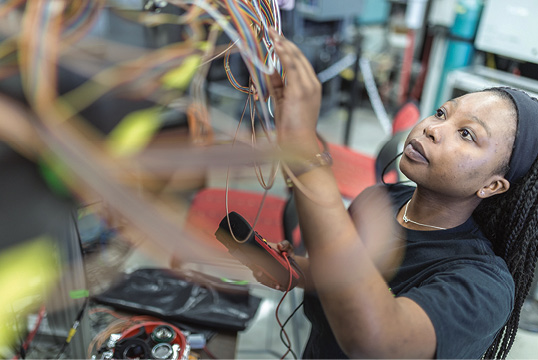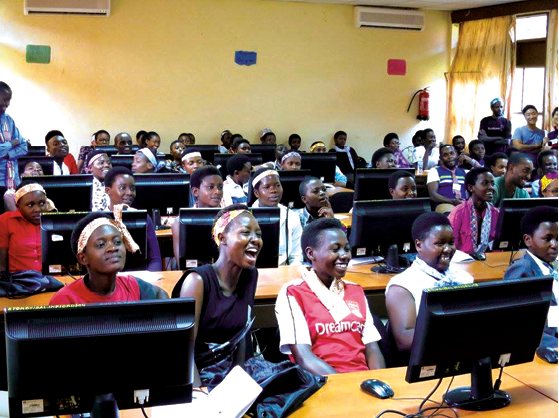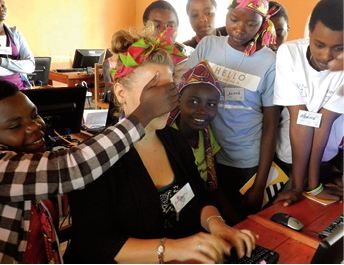Making Engineering a Little Less Lonely for Girls in Africa
- Panashe Mayangamutse
- Undergraduate Student
- Department of Electrical Engineering
- College of Engineering

Panashe Mayangamutse gains electrical engineering skills for future work in Zimbabwe.
 When Panashe Mayangamutse, a junior in MSU's Department of Electrical Engineering, came to the United States from Zimbabwe in 2015, she started on a pathway of family "firsts"—the first to come to the United States, the first to graduate from college, and the first to pursue engineering.
When Panashe Mayangamutse, a junior in MSU's Department of Electrical Engineering, came to the United States from Zimbabwe in 2015, she started on a pathway of family "firsts"—the first to come to the United States, the first to graduate from college, and the first to pursue engineering.
"If I were asked to name any female inventors, I would not even name one, because I didn't know any," said Mayangamutse. "So I wasn't sure if I wanted to get into engineering, because I thought maybe it would be a lonely field."
Growing up, Mayangamutse enjoyed spending time with her father as he "tinkered with things" around the house, planting a seed of curiosity that would later bloom into a desire to pursue engineering. When Mayangamutse was 13 years old, her father passed away, leaving her mother to care for four girls on a very meager income. But with help from her relatives, Mayangamutse was able to continue going to high school, where she heard about the United States Achievers Program (USAP), which provides opportunities to study in the U.S. From 1,200 applicants, Mayangamutse was one of only 28 selected. USAP helped her apply to MSU, where she declared as an electrical engineering major.
Through her education at MSU, Mayangamutse has had the opportunity to make numerous connections, both here and abroad. As a Mastercard Foundation Scholar, for example, she was able to travel back to Zimbabwe in summer 2017, where she interned at a large telecommunications company. "That was a really awesome experience," said Mayangamutse, "because you are connecting back, bringing what I learned in the U.S., back home. And also taking what I learned in Zimbabwe, and coming back and seeing if we have better solutions for it."
Camp TechKobwa
During summer 2016, Mayangamutse volunteered with Camp TechKobwa in Rwanda, a free, two-week camp organized and operated by the United States Peace Corps in collaboration with Michigan State University, IBM, Rwanda's Ministries of Youth and ICT, Girls in ICT, and the Akilah Institute for Women, that provides instruction and mentoring in computer skills, programming, and personal development to Rwandan girls and women, as well as to teachers of information and communications technology (ICT).
Mayangamutse was a technology facilitator at the camp, helping train Rwandan ICT teachers during the first week of camp on subjects such as practical applications of electronics and digital control, and then working with the teachers as they taught the kids during the second week. She loved seeing the teachers have the opportunity to work hands-on with equipment, such as capacitors. "They already know the theory—they've probably taught it a million times," she said. "But then, how does it actually work in a practical circuit?"
Elisabeth Turner, coordinator of Camp TechKobwa and former Peace Corps volunteer, was foundational in developing the camp in 2013. According to Turner, Rwandan technology teachers often lack classroom resources, and any available computers must be shared by groups of students, with male students often doing the typing. "To this end, and based on the Government of Rwanda's vision to become a middle-income economy with a foundation in information and communications technology, we designed Camp TechKobwa with the aim to empower female students to study and pursue careers in STEM," said Turner. (Kobwa comes from the Kinyarwanda word for "girl": Umukobwa.)

Girls at Camp TechKobwa Skype with Mayangamutse and other mentors.
Laura Dillon, professor in MSU's Department of Computer Science and Engineering, has collaborated with Turner, as well as with IBM executive and MSU alumna, Louise Hemond-Wilson, in developing curriculum for the camp. She acknowledged a steep learning curve as they navigated around limitations, such as lack of electricity in the classrooms. "We had to very quickly devise things that they could do without supportive technology," said Dillon. But the partners quickly adapted, made a number of revisions, and added a teacher training component to equip Rwandan ICT teachers in teaching STEM with limited resources.
"It's a train-the-trainer model," said Dillon. "First, it's getting the teachers there and spending time training them, and then immediately working with them on putting their training to practice. It's building an infrastructure that can grow exponentially as they take it back to their schools and teach other teachers. It was our thinking to get it packaged up so people could duplicate it."
The teacher training component takes place in the first week of camp. Then, when the girls arrive for the second week, the teachers help teach the curriculum to the girls, including sessions in basic computer skills, computer programming, photography, computer maintenance and security, and electronics, as well as leadership development, problem-solving skills, and career mentoring.
In five years, the camp has trained more than 420 girls and 70 ICT teachers, and according to Dillon, evaluations of the camp have shown significant increases in learning across the board. Feedback has also been positive, with school principals reporting that the girls are starting computing clubs and other activities at their schools.
All partners agree that the camp's intangible impacts are striking. "When the girls first come to camp, they are not confident at all," said Mayangamutse. "But by the end of camp, the girls are confident, vocal, and able to stand up and present their posters in English." Fellow volunteer, Matthew Rhodes, a senior in computer science and engineering, agrees. "TechKobwa is something that every girl should get to experience," said Rhodes. "The things taught have real world applications and are great ways to spark interest in a growing field."
"I consistently hear the impact the program had on these students' lives," agreed Turner. "Some of our students are now in university or using their skills to help their families, or even becoming ICT teachers themselves. The program is more than just teaching computer skills and programming basics; it is about empowering a generation of women with the confidence and mindset to overcome challenges with innovation and creativity."
Key to this empowerment is having successful female role models, which is what Mayangamutse loves the most. "Most of the girls have never seen women in engineering," she said. "So I always tell them my story. It's something I wish someone else had done for me, so now I can do it for the girls, which is really special."
Future Goals

Elisabeth Turner demonstrates touch typing to girls at the camp.
Heading into her senior year, Mayangamutse would like to specialize in power electronics and conversion, with the goal of working in the renewable energy sector. Remembering the plight of children in parts of Zimbabwe who spend hours fetching wood and water instead of studying, she hopes to help find sustainable energy solutions. "We have the sun. What's missing is the infrastructure," she said. "Hopefully I can get into energy systems and make something with renewable energy to provide energy for the rest of the country."
In the meantime, Mayangamutse continues mentoring girls here in East Lansing as an ambassador for the Women in Engineering (WIE) program at MSU. Each semester, WIE brings 400-500 girls to campus for Introduce a Girl to Engineering Day to showcase hands-on activities in engineering. "I am learning how I can take this experience, contextualize it, and put it into programs I can implement in Africa," she said.
Reflecting on some of the barriers she has overcome, Mayangamutse is thankful for the support she has received from MSU. "I think that's one of the biggest things that Michigan State has offered me," she said. "That you have a support network of people you can turn to when you're in the face of those barriers. So even if it might be intimidating as you go ahead, I think just having that support network is really key."
It's clear that her graduation from MSU will not be the end of blazing new paths for her family and community back home. "It has definitely been a lot of "firsts" and I think I'm not yet done," said Mayangamutse. "I think there are going to be a lot more firsts!"
- Written by Amy Byle, University Outreach and Engagement
- Photographs courtesy of Elisabeth Turner and MSU Communications and Brand Strategy